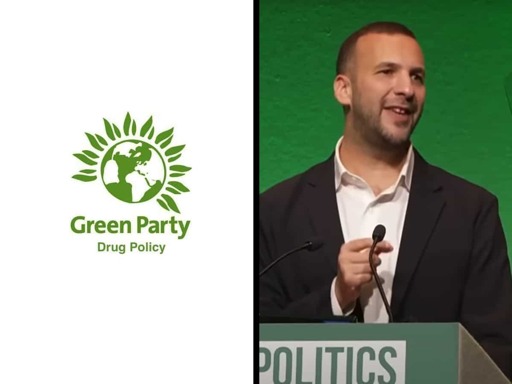Speaking at the Green Party conference, new leader Zack Polanski proposed the legalisation of drugs. His call follows half a century of the ‘war on drugs’, which has cost the West “more than a trillion dollars” without ever significantly restricting the availability of narcotics.
Drug prohibition is costly and ineffective.
The only ones who profit are drug cartels and street gangs.
Legalise, regulate and provide harm reduction + treatment.
It’s evidence based, and it works.
Stop criminalising addiction. Stop the dangerous supply of unregulated drugs. pic.twitter.com/U5GKPkEHPu
— Harry Eccles (@Heccles94) October 3, 2025
Zack Polanski: waging war on failed policies
The war on drugs began in 1971 under Richard Nixon. This war has gone about as well as Vietnam – Nixon’s other failed war – with the number of ‘dependent’ global drug users having risen from 40 million in the 1990s to 50 million today.
It’s no secret that there’s always been a racialised component to the war on drugs, with the war being used as cover to criminalise and incarcerate minority groups.
First, the most obvious evidence it was almost entirely racially motivated.
Richard Nixon began the war on drugs in ‘68 immediately after the civil rights movement. His campaign revolved around being “tough on crime.”
Here is a direct quote his domestic policy chief: pic.twitter.com/i7G5zndAmB
— Evan (@evanjmez) June 8, 2020
In the present day, the war on drugs is being used by America as cover for extra-judicial executions:
The ‘war on drugs’ has been one of the worst, expensive, violent US policy losers in the last 50 years. These desperate and poorly planned efforts are not going to solve or fix anything. I thought this administration was going to end wars. https://t.co/pfoaGbYPN2
— Dr Hoss T, PhD (@hoss_tagge) October 3, 2025
Zack Polanski said of the proposal to legalise drugs:
the war on drugs has absolutely failed, and ultimately we need to be having a public health approach
In a study on the potential of legalisation, researchers at Glasgow Caledonian University summarised that “there is considerable evidence to indicate that the drug laws (national and international) are unfit for purpose and may exacerbate the situation”.
Speaking on the regulation of drugs, Transform have argued that drugs could actually be more restricted under legalisation (as opposed to now, when anyone can buy anything at any time):
Legal regulation means that access to drugs would be more restricted.
Although the legal regulation of drugs is sometimes characterised as a ‘liberalisation’ or ‘relaxation’ of the law, it is in fact the opposite: it is about bringing the drug trade within the law so that strict controls can be applied. Such controls are impossible to impose under prohibitionLegal regulation enables responsible governments to control which drugs can be sold, who has access to them, and where they can be sold. Under prohibition, it is organised crime groups and underegulated vendors who make these decisionsWhen governments have control of the market they can put age limits on products, whereas people selling drugs in the illegal market do not ask for ID
It’s also important to remember that the violence related to the criminalisation becomes more extreme the closer you get to the source. While it’s rare for people to gun each other down in the street over cocaine in the UK, that’s sadly not the case in the countries which grow and export it:
“The War on Drugs Has Failed”
Colombian President Gustavo Petro closed out the Latin American and Caribbean Conference on Drugs by declaring the U.S.-led “War on Drugs” a misguided and bloody failure that has resulted in the loss of millions of lives in Latin America. pic.twitter.com/FbNWJG2qIN
— BreakThrough News (@BTnewsroom) September 15, 2023
Costs
Zack Polanski was asked about the ‘cost to the taxpayer’, presumably referencing costs like medical treatments (we assume the Green Party aren’t planning to make ketamine free). He responded to the question as follows:
Well, I think voters are having to pay right now for a crime that happens, for the fact that people are in the illegal drug markets, for gangs that we see across county lines.
All of this is a failure of the fact that, again, for far too long, Prime Ministers have stuck their heads in their sand and said, if we just make drugs illegal, everything’s going to be okay.
Speaking on the potential benefits of legalising cannabis, Transform have highlighted:
Significant annual net benefits to the Treasury of up to £1.5 billionOver 15,000 full-time equivalent jobs across cultivation, manufacture, retail and ancillary services£1 billion in potential tax revenue (from VAT, cannabis excise tax, income tax and National Insurance, and corporation tax)Approaching £300 million in savings across the Criminal Justice system (reduced spending on policing, Crown Prosecution Service, courts, Legal Aid and prisons).A regulated market could capture up to 80% of the current illegal cannabis market within five years
Change
Commenting on Polanski’s appeal, Novara’s Aaron Bastani noted that he’s actually providing answers to why modern life is the way it is:
Something now clear:
Reform have a diagnosis for Britain’s ills: immigration, judges, post 1997 settlement
Greens have diagnosis too: privatisation, elite wealth capturing democracy, post 79 settlement
Brings real, immediate clarity. Labour, Tories & Lib Dems don’t have it
— Aaron Bastani (@AaronBastani) October 3, 2025
The war on drugs is another area in which Zack Polanski is presenting a solution while establishment politicians bury their heads in the sand.
No one is saying that legalising drugs will end the problems of addiction, but it will certainly save people from being criminalised for facing those problems.
Legalisation should drastically increase safety while decreasing gang activity. In fact, about the only thing it won’t change is the availability of drugs for healthy adults. This country is full to bursting point with weed and pills; it’s time to stop pretending that isn’t the case and get on top of the situation.
Featured image via Green Party
By Willem Moore
From Canary via this RSS feed


